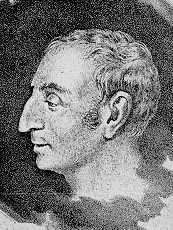| Profile | Major Works | Resources |
Claude Henri de Rouvroy, Comte de Saint-Simon, 1760-1825

Ruined aristocrat, an officer in the American Revolution war, a real estate speculator and journalist, Henri de Saint-Simon is reknowned as the founder of the "Saint-Simonian" movement, a type of semi-mystical "Christian-Scientific" socialism that pervaded the 19th Century. Saint-Simon envisaged the reorganization of society with an elite of philosophers, engineers and scientists leading a peaceful process of industrialization tamed by their "rational" Christian-Humanism. His advocacy of a "New Christianity" -- a secular humanist religion to replace the defunct traditional religions -- was to have scientists as priests. This priestly task was actually taken up by two of his followers -- Barthelemy-Prosper Enfantin (1796-1864) and Saint-Amand Bazard (1791-1832) -- who infected the whole movement with their bizarre mysticism and ritual.
Saint-Simon was crucial for the development of the social sciences: his call for a "science of society" on the same footing as the natural sciences, was highly influential on his disciple Auguste Comte and the sociologists and was the primary cause of the scientific pretensions of economics. One could count Thomas Carlyle, Michel Chevalier, John Stuart Mill and the young Léon Walras as adherents of Saint-Simonism.
Saint-Simon's vision was highly influential on French society ( and more generally, throughout Europe) all through the 19th Century, including the Emperor Napoleon III. The political highwater-mark of Saint-Simonism was perhaps the French July Revolution of 1830. But the influence of Saint-Simonism on future versions of socialism was more pronounced. Saint-Simon's "scientism" was particularly influential on the development of Marxian doctrine -- and, for that same reason, Saint-Simon was condemned by Hayek (1952).
Although Saint-Simon was one of the first to identify the process of "industrialization" as it was happening in Europe, his concern with the laboring classes was more reserved, although noting the "unnaturalness" of unemployment. In general, Saint-Simon's bourgeois elitism distinguished him from the later more "labor-orientated" socialist thinkers -- notably those radicalized by the 1848 Revolution, such as Louis Blanc and P.J. Proudhon. Indeed, Saint-Simon's enthusiasm for the "spontaneous harmony" of the "organism" of industrial society has led some to claim that he was really a Classical Liberal in disguise. The famed Saint-Simonian critique on private property (as well as the mystical glitter) was due more to his followers (notably Enfantin) than himself. But Saint-Simon was clearly a dirigiste in economic policy matters.
|
Major Works of Henri de Saint-Simon
|
|
HET
|
|
Resources on Saint-Simon
|
All rights reserved, Gonçalo L. Fonseca
